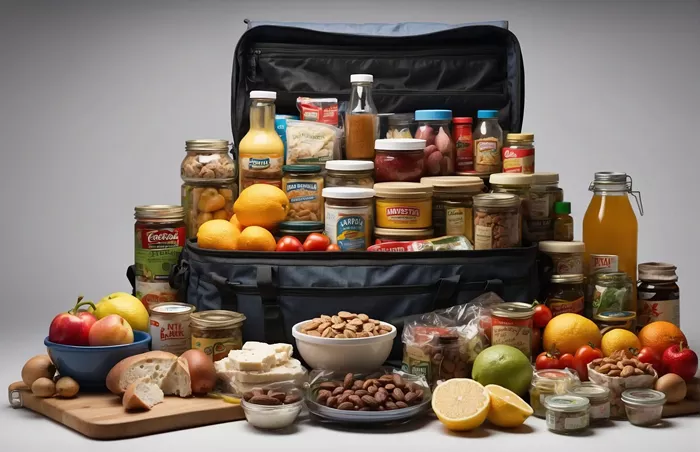Camping is a great way to connect with nature. But to enjoy it fully, you need the right food. Good meals keep you energized and happy. Planning meals for a three-day trip can be tricky. You need food that is easy to carry, simple to cook, and nutritious.
In this guide, we’ll cover:
- How to plan meals
- Best foods for breakfast, lunch, and dinner
- Snacks and drinks
- Cooking gear and storage tips
Let’s get started!
1. Meal Planning Basics
Before packing food, think about:
- Trip length: 3 days means 3 breakfasts, 3 lunches, and 3 dinners.
- Group size: More people = more food.
- Cooking method: Will you use a camp stove, fire, or eat ready-made meals?
- Storage: No fridge? Use non-perishable foods or a cooler.
- Weight: Lightweight food is best for hiking.
- Pro Tip: Pre-pack meals in ziplock bags to save space.
2. Breakfast Ideas
Breakfast is important. It gives you energy for the day.
Easy Camping Breakfasts
- Oatmeal: Just add hot water. Add nuts or dried fruit for flavor.
- Granola with powdered milk: Lightweight and filling.
- Eggs :Bring powdered eggs or pre-cracked eggs in a bottle.
- Pancakes: Use pre-made mix—just add water.
- Breakfast bars: Quick and no cooking needed.
- Why these work: They are fast, light, and need little cleanup.
3. Lunch Ideas
Lunch should be simple. You might be hiking or exploring.
Best Camping Lunches
- Sandwiches: Use tortillas (they don’t squish like bread). Add peanut butter, tuna, or cheese.
- Wraps: Fill with canned chicken, veggies, and sauce.
- Crackers and cheese: Long-lasting and easy to pack.
- Canned beans or soups: Heat if possible, or eat cold.
- Pro Tip: Avoid mayo—it spoils fast. Use mustard or packets instead.
4. Dinner Ideas
Dinner is the biggest meal. You’ll want something warm and filling.
Top Camping Dinners
- Pasta with sauce: Cook fast, add canned meat or veggies.
- Rice and beans: Lightweight, high in protein.
- Freeze-dried meals: Just add hot water—great for backpacking.
- Grilled meat or fish: If you have a cooler, bring fresh meat for the first night.
- Couscous: Cooks quickly and pairs well with spices.
- Why these work: They are hearty and easy to make over a fire or stove.
5. Snacks and Drinks
Snacks keep you going between meals.
Best Camping Snacks
- Trail mix: Nuts, seeds, dried fruit, and chocolate.
- Energy bars: Compact and full of calories.
- Jerky: High protein, lasts long.
- Fresh fruit (apples, oranges): No refrigeration needed.
- Crackers and nut butter: Quick energy boost.
Drinks:
- Water: Most important! Bring a filter or purification tablets.
- Tea or coffee: Instant packs are easy.
- Electrolyte powders: Good for long hikes.
- Pro Tip: Avoid sugary drinks—they dehydrate you.
6. Cooking Gear
The right tools make cooking easier.
Must-Have Camping Kitchen Gear
- Portable stove: -Lightweight and reliable.
- Pot and pan: Non-stick is best.
- Utensils: Spork, knife, and spatula.
- Biodegradable soap: For easy cleanup.
- Lighter or matches: Waterproof is best.
- Pro Tip: Pack a small sponge for cleaning.
7. Food Storage Tips
Keep food safe from animals and spoilage.
How to Store Food
- Cooler: Use ice packs for perishables (meat, cheese).
- Bear-proof containers: If camping in bear country.
- Dry bags: Keep food away from moisture.
- Hang food: Use a rope to keep it away from animals.
Never leave food in your tent—it attracts wildlife!
8. Sample 3-Day Meal Plan
Here’s an example of what to bring:
Day 1
- Breakfast: Oatmeal with dried berries.
- Lunch: Tuna wrap with crackers.
- Dinner: Pasta with canned chicken and sauce.
Day 2
- Breakfast: Granola with powdered milk.
- Lunch: Peanut butter tortilla with banana.
- Dinner: Rice and beans with spices.
Day 3
- Breakfast: Breakfast bars and coffee.
- Lunch: Cheese and crackers with jerky.
- Dinner: Freeze-dried meal (just add water).
9. Final Tips
- Pack extra food: In case of delays.
- Leave no trace: Pack out all trash.
- Test recipes at home: Make sure you like them.
With the right food, camping is more fun. Plan well, pack smart, and enjoy the outdoors!
Conclusion
In conclusion, planning meals for a three – day camping trip is a crucial part of ensuring an enjoyable outdoor experience. By considering factors like trip length, group size, cooking and storage methods, and weight, campers can select the best foods for breakfast, lunch, dinner, snacks, and drinks. Using the right cooking gear and following proper food storage tips not only makes cooking and food safety easier but also helps keep the campsite clean and wildlife – free. With a sample meal plan as a guide and some final tips in mind, campers are well – equipped to have a great time in nature, savoring delicious and nutritious meals throughout their adventure.
Related topics:
Best Camping Gear for Families: A Comprehensive Guide
What Food Do You Take Camping?
What to Pack for a Week-Long Camping Trip

